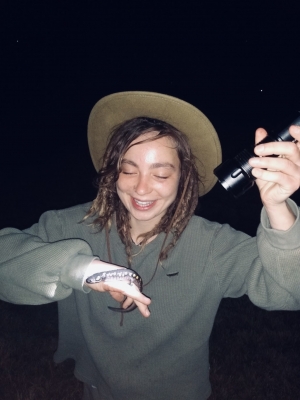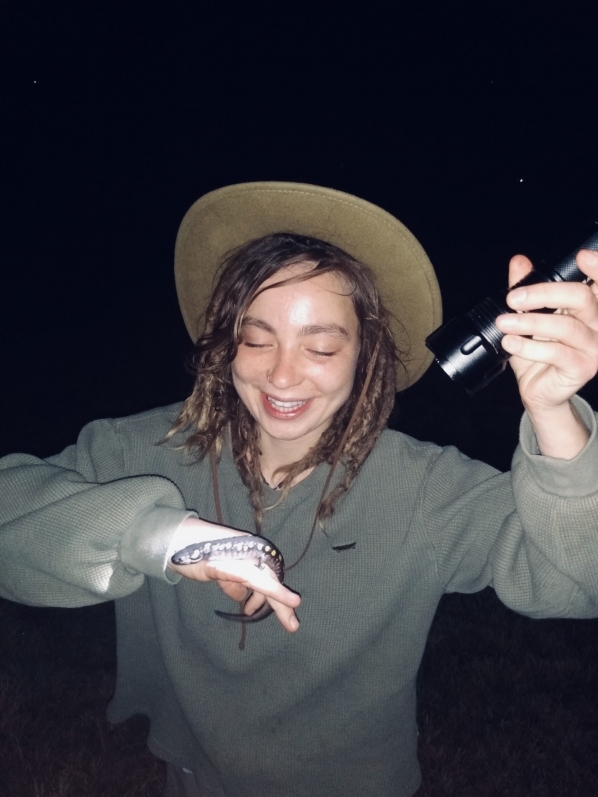SAFE Grant Student Spotlight: Chloe Dorin, Biology
Chloë Dorin is a graduate student from Raleigh, N.C.
Student and Faculty Excellence (SAFE) fund recipient
Project: “Relationship between a reproductive polymorphism in the spotted salamander and its unicellular algal symbiont”
Dorin utilized SAFE funding to have a critical piece of equipment serviced for her research on the spotted salamander. The YSI Pro Series Multi-Meter is used to sample aspects of spotted salamander breeding ponds. As the breeding season usually begins in February, it was essential for the device to be serviced to ensure that data collected is accurate.
“My research requires several pieces of highly specialized equipment that are rather costly both to obtain and maintain. These costs can be a highly limiting factor in planning and implementing my research project,” explained Dorin.
Dorin’s research project investigates the only known case of a vertebrate, the spotted salamander, that engages in a close relationship with a type of algae which moves into the embryo of the salamanders. She also investigates the types of eggs that spotted salamanders produce. During February’s salamander breeding season, Dorin tested a previously unexplored hypothesis regarding the evolution of traits that allow for the salamander’s relationship with the algae.
“The primary thing that first drew me into this research that still keeps me working is how beautifully complex it is. I see the entire system as a wonderful, very complicated puzzle, and trying to solve it brings me a lot of joy. I never cease to be awed by the complexity that evolution has produced in this system and I feel deeply privileged to have the opportunity to witness it through the lens of science,” said Dorin.
Her research spanning the past three years began with collaborating with Dr. Lynn Siefferman, associate professor and director of the Biology Honors Program and Dr. Michael Gangloff, assistant professor, both from the Department of Biology. Research was initially conducted for Dorin’s undergraduate honor’s thesis project and will also be used for her master’s thesis.
“Ultimately, I decided to start my master's degree here at Appalachian through accelerated admissions largely because of how much I wanted to continue working on this project and how incredible of a mentor Dr. Siefferman is. This project is one of the most integrative and interdisciplinary projects I could ever hope to work on,” said Dorin.
Researching the spotted salamander has equipped Dorin with a variety of skills across the fields of aquatic biology, behavioral ecology, evolutionary biology, plant physiology, community ecology, biochemistry, genetics, microscopy and microbiology. After completing her master’s degree at Appalachian, she intends to pursue a Ph.D. also focused on symbiosis.
Dorin added “This project will leave me more than prepared to undertake my Ph.D., and I may even continue to work on this system for that degree. Overall, the money from the SAFE grant enhanced my student experience tremendously in that it has helped facilitate my ideal master's thesis project on the spotted salamander. I am tremendously grateful to have received this funding and for how it has enabled me to conduct my research project in the way I envisioned it.”
###
About The SAFE Fund
Initially endowed by Hughlene and Bill Frank, the College of Arts and Sciences Student and Faculty Excellence (SAFE) Fund provides resources that can be used to support undergraduate, graduate and faculty experiences. The SAFE Fund provides funding for college priorities and opportunities that arise throughout the year. These unrestricted funds support student and faculty travel, publication support for faculty and student research opportunities. Learn more at: https://cas.appstate.edu/students/student-and-faculty-excellence-safe-fund.
About the Department of Biology
The Department of Biology is a community of teacher-scholars, with faculty representing the full breadth of biological specializations — from molecular genetics to landscape/ecosystem ecology. The department seeks to produce graduates with sound scientific knowledge, the skills to create new knowledge, and the excitement and appreciation of scientific discovery. Learn more at https://biology.appstate.edu.
Compiled and written by Sophia Woodall
October 15, 2021
BOONE, N.C.

